Counseling Services
Cognitive Behavioral Therapy (CBT)
Cognitive behavioral therapy (CBT) is a form of psychological treatment that helps individuals learn to recognize and change irrational, disturbing, or damaging thought patterns that negatively affect emotion and behavior. It is based on the connection between our thoughts, emotions, and actions, meaning how we think and feel often affects how we behave. CBT therapy focuses on identifying and challenging the spontaneous and automatic negative thoughts and perceptions that often result in emotional distress, anxiety, and depression. Once these thought patterns are identified, people are taught to replace them with more objective and realistic thoughts, which can lead to positive behavioral changes.
CBT therapy tends to focus on current issues and issues moving forward. It involves a variety of techniques as one size does not fit all. Although this is not an exhaustive list, CBT therapy techniques may include:
Identifying goals that are specific, measurable, achievable, realistic, and time-limited (SMART).
Questioning to discover assumptions you may have about yourself or a situation that may need to be challenged or expanded.
Journaling helps identify negative thought patterns which can be replaced with positive ones.
Learning positive self-talk can help replace critical thoughts with more kind and compassionate self-talk.
Cognitive restructuring looks at identifying and replacing cognitive distortions that may negatively affect thoughts such as all-or-nothing thinking, overgeneralization, catastrophizing, or should/must beliefs.
Thought recording helps one develop more realistic thinking patterns by recording thoughts produced by a particular situation and putting that thought on trial with unbiased evidence for and against the negative belief.
Positive activities are scheduled to improve mood such as enjoyable exercise, a picnic, a long bath, or watching a favorite show.
Homework is an important part of CBT therapy to practice and improve the techniques learned such as catching negative self-talk and replacing it with empathetic talk.
CBT therapy can be used to treat many different issues; you don’t need a mental health diagnosis to reap its benefits. It is often popular because it’s a brief, structured form of therapy that can help one quickly identify and deal with specific problems. CBT therapy can address emotional challenges and help someone:
Learn coping techniques for a variety of general life stressors
Identify and manage emotions, including anger
Deal with career issues
Learn communication skills and conflict resolution
Deal with relationship difficulties or low self-esteem
Set goals and increase motivation/focus
Treat Insomnia
Cope with grief, loss, a medical illness, and trauma caused by abuse/violence
Manage chronic physical symptoms (IBS, fatigue, pain, injuries)
CBT therapy can improve many mental health disorders including:
Depression
Anxiety disorders, including panic and phobias
Attention-deficit/hyperactivity disorder (ADHD)
Post-traumatic stress disorder (PTSD)
Sleep disorders
Eating disorders
Obsessive-compulsive disorder (OCD)
Substance use disorders
Bipolar disorders
Schizophrenia
Sexual disorders
A 2018 meta-analysis of 41 studies found that CBT helped to improve symptoms in people with anxiety and anxiety-related disorders. CBT for anxiety looks at the negative distortions in how we perceive ourselves, others, and the world around us. The goal of CBT for anxiety is to identify and correct these negative distortions and beliefs that contribute to anxiety. The idea is if you change the way you think, you can change the way you feel. If you can change the way you feel, you can change the way you react in situations that trigger anxiety.
CBT for anxiety techniques include:
Learning to recognize when you are anxious and what it feels like in your body
Learning coping skills and relaxation techniques to counteract anxiety and panic
Confronting imagined or real fears
Additionally, several studies have shown the effectiveness of CBT in depressive disorders. A meta-analysis of 115 studies has shown that CBT is an effective treatment strategy for depression and combined treatment with medication is significantly more effective than medication alone. CBT for depression aims to correct irrational thinking which leads to depression. It addresses issues of dependence, helplessness, and hopelessness by teaching appropriate responses and coping techniques to feelings of depression.
Benefits arise from many types of therapy, but CBT offers the following specific key advantages:
Time – the course of therapy is short – typically 5 to 20 sessions in all.
Affordable – because of the short duration, CBT therapy may cost less than other options.
Long-term results – research on depression shows that those who have engaged in CBT therapy are less likely to relapse than those who took antidepressants with no therapy.
Flexible – sessions may be offered in various formats including in-person, online, over the phone, individual or group
Practical – tools acquired, and skills learned in CBT can be applied immediately to everyday life.
Empowering – people are empowered by their active role in their own healing through CBT. Over time, the goal is to use the tools learned from CBT to overcome issues on their own.
Healthier thinking – makes one aware of negative and unrealistic thoughts that darken moods allowing one to engage in healthier thinking patterns
Starting therapy can feel scary and overwhelming, and you may feel nervous about your first session. It can be difficult to share thoughts and emotions with a stranger but be assured you will be received with warmth and unconditional positive regard by a Heritage counselor. One of our goals is to establish a relationship that promotes your healing.
Your first visit to a Heritage counselor is focused, structured, and typically an hour and 50 minutes in length. Your therapist will discuss the following with you:
Emotions, feelings, and symptoms you are experiencing include physical symptoms such as headaches, stomach upset, or body aches.
Specific difficulties you are facing, no matter how large or small. Feel free to share anything that comes up for you.
A few general therapy policies and procedures, such as cancellation policies and confidentiality, session length (normally 50 minutes after the first session), and the number of sessions your therapist recommends.
Goals for therapy and what you want from treatment
Questions you may have regarding anything that comes up during the first session, including, but not limited to the counselor’s areas of expertise, how you’ll know therapy is helping, what will happen in future sessions, and how your therapist can help if you are having thoughts of suicide or find yourself in a crisis.
Although CBT therapy can improve the distress you may experience, it will not necessarily eliminate it all. CBT therapy techniques aim to give you the tools to deal with difficulties as they inevitably arise in life. Results take time, possibly weeks or months. There is little risk to engaging in CBT, but therapy can be very emotionally challenging, even painful sometimes. During a challenging session, you may experience anger, tears, fatigue, or general upset. Restructuring long-term negative thought patterns are major work, so patience and kindness towards oneself are key.
If you think Cognitive Behavioral Therapy may be a good fit for you, please call 214-363-2345 and speak with our admistravice team. We can pair you with a therapist that specializes in your specific needs to get you to where you want to go.
Related Blogs
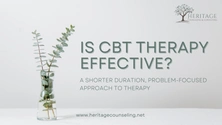
Is CBT Therapy Effective?
Cognitive Behavioral Therapy is an evidenced-based treatment for a variety of mental disorders. CBT has two underlying tenets: our thoughts have an impact on our emotions and behaviors, and our behaviors...
Published on Mar 3, 2023
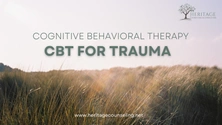
Cognitive Behavioral Therapy for Trauma
CBT Therapy Cognitive Behavioral Therapy, CBT, is a treatment modality that helps individuals learn to identify unhelpful thought patterns that negatively impact their emotions and behavior. CBT is based on...
Published on Apr 4, 2023
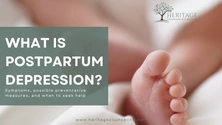
What is Postpartum Depression?
Postpartum Depression Postpartum depression (PPD) is an extreme mood disorder that can affect women after childbirth. It is a type of depression that can occur within the first few weeks or months after...
Published on Apr 28, 2023

Social Media’s Effect on Body Image
Social Media was created as a platform for individuals to safely express themselves; however, as the years have gone on, the standards of social media have changed. Social media can be a powerful tool for...
Published on May 5, 2023

Treating OCD in Therapy
What is OCD? Obsessive Compulsive Disorder is a common mental health disorder in which people have unwanted, reoccurring thoughts, fears, worries, ideas, sensations, or urges (obsessions) that lead them to...
Published on May 25, 2023

Autism Testing: Your questions answered by Dr. Casey Ferri, Psy.D., M.S.
What is Autism Spectrum Disorder? Autism Spectrum Disorder (ASD) is a developmental disorder that is most commonly identified at an early developmental age, or once social demands become more prominent...
Published on Jun 29, 2023

How to Help Children with Food Anxiety
Food Anxiety in Children Are mealtimes starting to feel like routine meltdowns? Is your child’s picky eating causing daily distress? Do you find yourself engaging in power struggles with your child when it...
Published on Sep 29, 2023
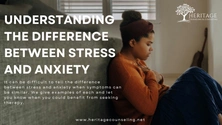
Understanding the Difference Between Stress and Anxiety
In today's fast-paced and interconnected world, stress and anxiety have become prevalent issues affecting millions of people worldwide. The modern lifestyle is characterized by constant demands, high...
Published on Mar 20, 2024
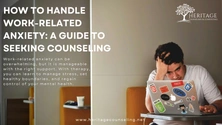
How to Handle Work-Related Anxiety: A Guide to Seeking Counseling
Work-related anxiety is a common issue that affects countless individuals across various industries. The demands of tight deadlines, high expectations, long hours, and the pressure to perform can create an...
Published on Jan 21, 2025

Discover Heritage Counseling & Consulting’s Dallas Office
At Heritage Counseling & Consulting’s Dallas location, we are proud to offer exceptional mental health services tailored to the diverse needs of our clients. Conveniently located next to Mockingbird...
Published on Feb 28, 2025

Discover Heritage Counseling & Consulting in Austin, Texas
At Heritage Counseling & Consulting, P.A., our Austin office is dedicated to providing exceptional mental health care tailored to each individual's unique needs. Conveniently located off Highway 360 near...
Published on Apr 3, 2025
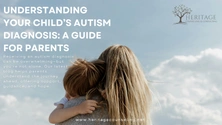
Understanding Your Child’s Autism Diagnosis: A Guide for Parents
Understanding your child's autism diagnosis is an important step in learning how to best support their growth and development. According to the Centers for Disease Control and Prevention (CDC),...
Published on Apr 11, 2025